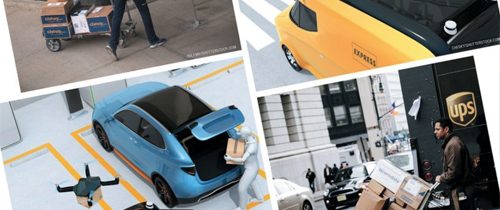Sustainable Last Mile Deliveries
Content was pulled from MHI Solutions Magazine Q4.2019
The cost of global parcel delivery, excluding pickup, line-haul and sorting, is more than $78.5 billion, with last mile delivery costs reaching or exceeding 50% of the total, according to a McKinsey & Company report. The growth of parcel deliveries will continue to increase, with volumes doubling by 2026, and business-to-consumer (B2C) deliveries increasing from 40% of the total to 50%.1
In addition to presenting financial and labor-related challenges, logistics providers also face sustainability challenges as the effect of CO2 and other emissions from traditional vehicles in congested areas cause concern for consumers and lawmakers.
And the effects are not limited to companies on U.S. soil. It is a worldwide challenge that is seeing a variety of solutions around the globe, including Europe, where the challenges are being met with smart urban solutions that incorporate electric vehicles and centralized pick-up hubs.
“Over 73% of Europe’s inhabitants live in cities and the projected increase in parcel volumes along with urban center congestion and CO2 emissions demands a change in strategies, said Carmen Cureu, market research director at DPD Group. “Logistics companies have a responsibility to act in a sustainable manner and to measure and continually reduce their impact on the environment.” The combination of climate change discussions, stricter regulations and consumer interest in environmentally friendly business strategies make sustainability a key priority for logistics companies, she added.
DPD is testing a variety of new delivery methods that include drones on one commercial line in South of France that has operated since 2016. Alternative fleets that include electric vehicles and e-bikes is also a major trend, said Cureu. In fact, DPD has set a goal to deliver all parcels in Paris with an all-electric fleet by the end of 2019, she added. “In London, our Westminster micro-depot is an all-electric last-mile delivery site and in Warsaw, DPD’s efforts have reduced our CO2 footprint by 90% in one year,” she said.
German freight company Dachser has turned to electric vehicles and pedelecs—bicycles that have a small electric motor to assist riders’ pedaling—to address the challenges faced when delivering in urban areas, some of which are introducing delivery restrictions such as limited access and delivery windows in some areas.
“As things stand, logistics faces two major challenges in large cities and city centers: smaller consignments and just-in-time deliveries,” said Dr. Hella Abidi, research and development consultant at Dachser SE. “Both of these generate increased downtown delivery traffic, causing congestion and holdups, not to mention a rise in noise emissions, exhaust gases and particulates,” she added.
Red full article in MHI Solutions Magazine





